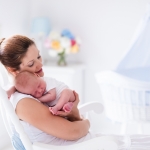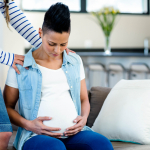Postpartum psychosis is rare, occurring in about 1 to 2 per 1000 women after delivery. While there appears to be a strong link between postpartum psychosis and bipolar disorder, it is estimated that about half of women who present with postpartum psychosis have no psychiatric history prior to delivery, making it difficult to identify those women who are at greatest risk for this illness. A recent study, using data from the Swedish Medical Birth Registry, has examined possible risk factors that may be used to identify women at risk for postpartum psychosis.
Data from all first-time mothers registered in the Swedish Medical Birth Registry from 1983 to 2000 (n = 745,596) were examined. The authors found that 892 of these women (1.2 per 1,000 births) had been admitted to a psychiatric hospital with a diagnosis of psychosis within the first 90 days postpartum, a rate which is consistent with previous epidemiologic studies. Nearly half of these women had had no psychiatric hospitalization prior to the postpartum episode.
The authors assessed an array of potential risk factors, including age, marital status, years of education, and concurrent medical illness. Potential obstetric and perinatal risk factors included perinatal death (stillbirth or infant death within 7 days), congenital malformations, mode of delivery, complications at delivery, infant’s gender, gestational age, and birth weight.
In this study, it was determined that older mothers (over 35 years) are about 2.4 times as likely to experience postpartum psychosis than younger mothers (under 19 years). Lower birth weight increases the risk of postpartum psychosis, whereas gestational diabetes and high birth weight were associated with a reduced risk of first-onset psychoses during the postpartum period.
This study is the largest to date to examine the risk factors for postpartum psychosis. Consistent with previous reports, this study indicates that the first month after delivery is the time of greatest risk for psychotic illness. It was estimated that women without any previous psychiatric hospitalizations before delivery had a ten-fold higher risk of psychiatric hospitalization during the first month postpartum compared to after 90 days postpartum.
Its findings are somewhat different, however, from earlier studies which have identified being single, preterm delivery, and other obstetric complications (including perinatal death) as potential risk factors for postpartum psychosis. In general, there has been a fair amount of discrepancy among studies which have attempted to identify risk factors for postpartum psychosis, a fact that may reflect differences in methodology but may also point to the underlying heterogeneity in this population of women who present with postpartum psychosis.
This study and its predecessors suggest that we have yet to identify risk factors, other than a history of bipolar disorder or psychotic illness prior to delivery, that can help us to reliably identify those women at greatest risk for postpartum psychosis. This underscores the importance of educating all women and health care providers regarding the symptoms of postpartum depression and psychosis, so that early identification of the symptoms can lead to prompt initiation of treatment.
Ruta Nonacs, MD PhD
Valdimarsdóttir U, Hultman CM, Harlow B, Cnattingius S, Sparén P. Psychotic illness in first-time mothers with no previous psychiatric hospitalizations: a population-based study. PLoS Med 2009: 10; 6(2):e13.








Leave A Comment